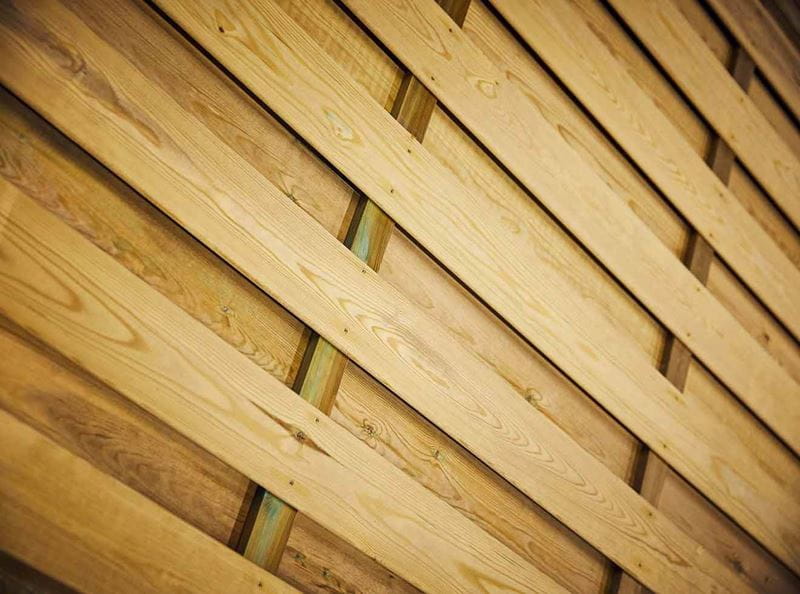15/01/2024 12:00 AM
What type of timber is best for fencing?
Like with any product on the market, the best timber will be low maintenance, safe, and will stand the test of time while looking good.
Different timber fencing components can be made from various types of timber which is tailored to its specific use. For example, fence panels are less susceptible to rot compared to fencing components like fence posts or gravel boards as they are not in direct contact with the ground, so are made from a different species of timber. Fence posts and gravel boards that are in contact with the ground will be made using species that are typically less susceptible to rot to ensure protection.
Below we discuss the types of timber and some of the processes that they go through to become well suited for life outside as fencing, gates, and decking.
Softwood fencing
Softwood is chosen by many manufacturers as it comes from fast growing trees and is good at absorbing treatment. Softwood is harvested from evergreen trees like pines and ferns. Softwood is much easier to work with and most species are readily available, making them the ideal choice for fencing. The trees can be harvested every 40 years, so investing in a quality softwood fence, with a lifetime guarantee of at least 25 years will ensure a low or close to zero carbon footprint. Depending on the type of softwood species used, the timber is usually aesthetically pleasing, with minimal knots and imperfections.

Hardwood fencing
As the name suggest, hardwoods are very tough with close grains. They are heavy in nature and sourced from deciduous trees (trees that lose their leaves annually) and are slower growing trees like oaks, making them harder to source and much more expensive. Unlike softwood timber, hardwood is very difficult to treat for longevity. It can be treated with surface protection, but this means that it is high maintenance and even more costly in the long run. Due to the length of time a hardwood tree takes to grow before harvest (up to 150 years), the carbon footprint on a hardwood fence is much higher than softwood. Hardwood is traditionally used for indoor use and is preferred for fine furniture, cabinetry, and flooring.;
Timber Treatment
If left untreated, hardwood in outdoor conditions will last longer than untreated softwood. When treated correctly, softwood will undoubtedly last longer than any hardwood. When treating a hardwood fence, this must be done regularly by the end user applying a surface preserver such as oil or stain. Softwood fencing can be treated by the manufacturer to guarantee maintenance free longevity. Opt for a good quality manufacturer which uses pressure treated timber and offers a long guarantee.
Depending on the manufacturer, the guarantee period will vary. The longest guarantee offered on the market today is 25 years. Be wary of suppliers using the words ‘expected lifespan’. This is not a guarantee and you will not be able to claim against this.
The Wood Protection Association (WPA) released a campaign highlighting different treatment classes. The class refers to the minimum level of treatment so that the timber is suitable for use in the application. In regard to timber fencing, timber that is intended for use in contact with the ground, freshwater, or for exterior structural support must be class 4. Anything less; the service life and structural safety will be greatly impacted.
What type of timber do Jacksons Fencing make their fencing from?
We choose softwood to make the majority of our timber products. Why? All our timber is derived from three main species, all of which are very good at soaking up our unique timber treatment. Treatment can penetrate deep into the centre of the wood, therefore offering the best protection. We can also source these specifies from sustainably managed forests, which is a key component of our environmental policies. These softwood varieties are also easier to cut and shape, allowing us to create our contemporary and intricate panel designs.
What type of timber lasts the longest?
Hardwoods will last the longest, but most timber fences aren’t made from hardwood. A good quality softwood like, pine or spruce that has been pressure treated, with a long lifetime guarantee offered by the manufacturer will last for over 25 years.
What type of wood won’t rot?
A fence that won’t rot is one that has been treated properly to the correct level for its intended use. Always choose pressure treated timber rather than dip treatment. If you want timber that won’t rot, look for a manufacturer’s guarantee, without this, the manufacturer doesn’t show any confidence in their product and the longevity of it.
Read our blog how long does a fence last for more information
Why invest in premium fencing and what makes wooden fencing more expensive